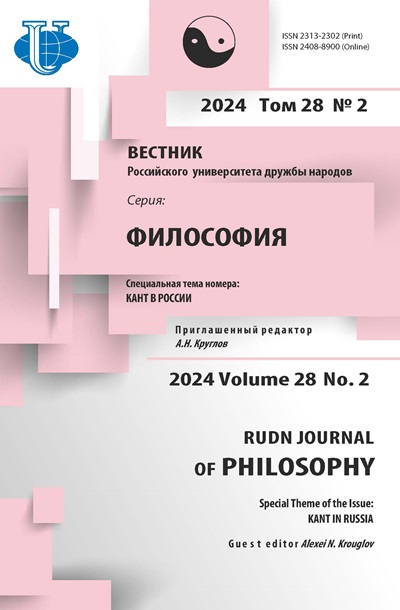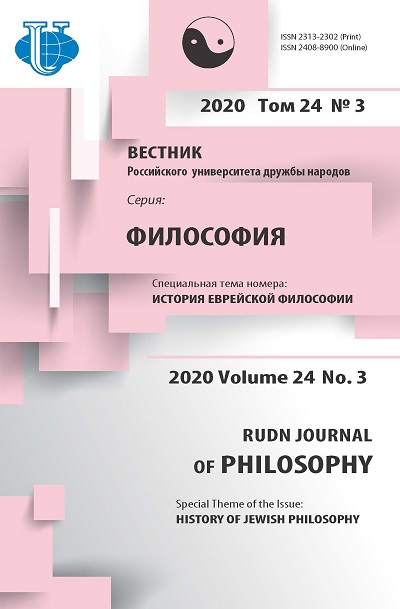From Voluntary Action’s Ontology to Historical Responsibility: Methodology of Philosophical Research
- Authors: Anikin D.A.1,2
-
Affiliations:
- Lomonosov Moscow State University
- Tomsk State University
- Issue: Vol 24, No 3 (2020): HISTORY OF JEWISH PHILOSOPHY
- Pages: 457-466
- Section: PERSON AND SOCIETY
- URL: https://journals.rudn.ru/philosophy/article/view/24358
- DOI: https://doi.org/10.22363/2313-2302-2020-24-3-457-466
Cite item
Full Text
Abstract
In the article, the author analyzes methodological approaches to the study of the concept of “historical responsibility,” comparing the German tradition of study (H. Arendt, T. Adorno) with the voluntary action’s ontology of M.M. Bakhtin 's. The German tradition, influenced by the thinking of World War II, emphasizes the perception of responsibility in the context of the relationship with guilt, which raises a substantial question about the nature of responsibility and its boundaries. In particular, H. Arendt formulates the concept of “banality of evil,” focusing on the disappearance of internal perception of responsibility, but does not solve the question of the origins of such feeling. The Russian religious tradition, presented by M.M. Bakhtin, allows to propose a way to solve the issues raised due to the identification of ontological grounds of individual responsibility. Nevertheless, M.M. Bakhtin conclusions are also important for solving the problem of collective responsibility. Bakhtin addresses responsibility as an ontological characteristic of human existence, opposing its freedom. Responsibility manifests itself in acts, but ontologically precedes a separate action performed by a person. The role of the act is that it allows the person himself to understand the burden of responsibility and act on these prerequisites. The transfer of the Bakhtin’s methodology from individual to collective responsibility makes it possible to link the moment of its occurrence not to public recognition, but to the very fact of the individual 's entry into a certain community. The ontological integrity of the individual also acquires a social dimension, not only synchronic but also diachronic. According to the author, the application of the Bakhtin’s methodology in the field of social research makes it possible to consider problems of historical responsibility in the context of more fundamental philosophical questions about the relationship between individual and collective identity, the dynamics of identity, the combination of regularity and variability in human behavior.
Keywords
About the authors
Daniil A. Anikin
Lomonosov Moscow State University; Tomsk State University
Author for correspondence.
Email: dandee@list.ru
Cand.Sc. in Philosophy, Docent at the Faculty of Political science, Moscow State University, Moscow, Russia; Research assistant, Tomsk State University, Tomsk, Russia
GSP-1, Leninskie Gory, Moscow, Russian Federation, 119991; 36 Lenin Ave., Tomsk, Russian Federation, 634050References
- Jaspers K. Question of guilt. On Germany 's political responsibility. Moscow: Progress, 1999. 218 p.
- Adorno T. What is meant by “working out the past”. Neprikosnovennyj zapas. 2005; (2—3): 36—45.
- Arendt H. Responsibility and judgment. Moscow: Gaidar Institute Publishing House, 2013. 368 p.
- Bakhtin MM. Art and Responsibility. In: Bakhtin MM. Aesthetics of verbal creativity. Moscow: Art, 1986. P. 7—8.
- Pechey G. Mikhail Bakhtin: The Word in the World. London: Routledge; 2007. 202 p.
- Belov VN. "Eternal Problems" in the Study of Creativity of M.M. Bakhtin. Filosofskij poliglot: Zhurnal mezhdunarodnogo centra izucheniya russkoj filosofii. 2017; 1: 143—155.
- Belov VN. Perception of M.M. Bakhtin in the West: some general comments. RUDN Journal of Philosophy. 2017; 21(1):93—97.
- Bakhtin MM. To Philosophy of Action. Philosophy and Sociology of Science and Technology. Yearbook 1984—1985. Moscow: Nauka; 1986. P. 80—160.
- Burton S. Bakhtin, Temporality, and Modern Narrative: Writing “the Whole Triumphant Murderous Unstoppable Chute”. Comparative Literature. 1996; 48 (1): 39—64.
- Hirschkop K, Shepherd D. Bakhtin and cultural theory. Manchester University Press; 1989. 188 p.
- Shevtsova M. Dialogism in the Novel and Bakhtin's Theory of Culture. New Literary History. 1992; 23 (3): 747—763.
- Guseynov AA. The Philosophy of the Act as the First Philosophy (An Interpretation of Bakhtin’s Moral Philosophy. Voprosy Filosofii. 2010: 6: 59—72.
- Pisarchik TP. Development of the methodology of humanitarian knowledge and the problem of dialogue in the concept of M.M. Bakhtin. Vestnik Orenburgskogo gosudarstvennogo universiteta. 2012; (7): 46—54.
- Morson GS, Emerson C. Mikhail Bakhtin: Creation of a prosaics. Stanford: Stanford university press, 1990. 530 p.
- Kim G. Mikhail Bakhtin: The philosopher of human communication. The University of Western Ontario Journal of Anthropology. 2004; (1): 53—62.
- Schuster C. Mikhail Bakhtin as Rhetorical Theorist. Landmark Essays on Bakhtin, Rhetoric and Writing. Ed. Frank Farmer. Mahwah: Hermagoras Press; 1998. P. 1—14.
- Olkhov PA. Historism M.M. Bakhtin and modern problems of epistemology of historical knowledge. Filosofiya i kul'tura. 2011; (7): 116—124.
















